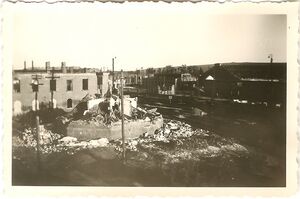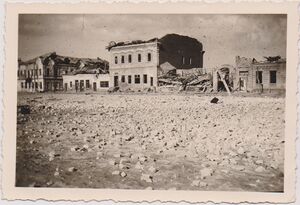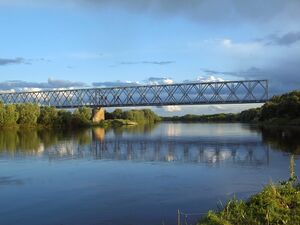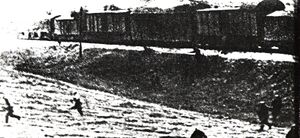2. August 1942
’
| GEO INFO | ||||
|---|---|---|---|---|
| Rail transport Sloviansk–Barwenkowo–Losowaja–Charkow–Desna bridge at Vitemlja–Gomel | ||||
| Partisan raid –Bobruisk–Minsk | ||||
| –Baranowichi–Warsaw–Neuhammer | ||||
We are back in Sloviansk.[1] The battalion is billeted in the south-west[2] of the town, near the railway station. Diagonally opposite, across the wide brook valley, is the small village[3] from which we had entered Krassnoarmeisk. That was back in the hard winter fighting, when Slavyansk was still a fortress and closed in on three sides.
Today, the city is the deepest rear area. All sorts of gold pheasants and brown Nazi bigwigs prance through the streets like splayed peacocks. Uniforms I’ve never seen. Their offices are swarming with shirkers who all want to die for their Führer, but unfortunately are all indispensable here, back here in the rear. There are many pretty Russian girls working in their offices, but in the face of these representatives of the Russian “untermenschen” they forget all their trained racial conceit. When we defended the city against the pincer attacks of the Red Army in bloody defensive battles in the freezing cold last winter, these heroes were not here. But now they are spreading like a cuckoo in a songbird’s nest. They issue regulations, decrees, bans, take coercive measures, behave like a bull in a china shop and make themselves even more unpopular with friend and foe alike than they already are. They undermine the friendly sympathies that have been shown to the Germans, the soldiers, up to now in spite of everything. And if you meet such a pompous frog in the street, he makes googly eyes because you don’t salute him. Undoubtedly, there are also very reasonable people among them, but they are not capable of giving the organisation a different face. And so - as always in the world - it is up to the loud-mouthed, the big-man addicts and the schemers who, apart from their brash demeanour, lack any intellectual qualification and psychological intuition to understand and treat a foreign people properly. The most capable minds should have been sent to the East, but not those whom the Old Reich wanted to get rid of because of their uselessness.[4]
We lead a lazy life and stand around in gym shorts with bare upper bodies on the village streets of this suburban area. Rumour has it that we are to be loaded and perhaps go to France to regenerate.
I am standing with Max Müller and a sergeant in front of the sergeant’s quarters. The woman I had accompanied through the town months ago, but who wouldn’t let me come with her as far as her house, passes by. She is accompanied by another woman and is so engrossed in conversation that she doesn’t even see me. So this is where she lives!
For a few days now, I notice that my butter ration is getting smaller and smaller, even though I hardly eat any of it. My suspicion falls on my Hasiaika’s twelve-year-old granddaughter. It’s the same situation as in Dimitriyevka with the cigarettes. I go to our medic to get a laxative. I want to mix it into the butter and thus convict the thief. But it fails because the butter changes colour and the thief is warned. I then tell the Babushka, who immediately scolds the girl terribly, apologises and offers me a few kilos of potatoes as compensation. But I go without, because the people don’t have much to eat themselves.
There are two houses on the neighbouring plot. A man lives in the bigger one. The other is as small as a doll’s house and is inhabited by a young woman. In the middle of the yard is a well with a bench. I am sitting on this bench when the young woman approaches to fetch water. We start talking and she tells me that her husband is in the Red Army but hasn’t written in a year. She doesn’t know if he is alive, dead or a prisoner. I casually ask her if she has not joined the man in the house next door. She deflects: “But that’s my brother-in-law! Well, if it wasn’t my brother-in-law...” From now on I meet this woman a few times, in the evening after work. She seems to be quite happy about this long-lost change. Once we were in the dark garden adjoining the courtyard, where there are many cherry trees. Another time we went to their little house in the evening, which only has a kitchen and a small room. The brother-in-law is watching us. He suspects something and tells me so. Of course I wave him off. Did he really think I would blab?
The rumours that we are coming to France seem to be true. According to divisional orders, we are to fire all our reserve ammunition in small exercises so that we don’t have to entrain it.
Today we are practising an attack at short range. I support the attack of the rifle company with mortars. First I fire brisance grenades, which are exactly and correctly in front of the firing line. Shortly before “penetration into the enemy positions” I intensify the fire and also use jumpers. These are grenades - or so I was told - with double fuses that jump up again after impact and explode at a height of about ten metres. This gives them a greater fragmentation effect. This means that you have to set a further distance in order not to endanger your own people in the attack. Of course, you have to consider this beforehand. But I only noticed it when I watched through my binoculars how the men in front pulled their heads in and pressed themselves against the ground. Fortunately, nothing happened. My only weak excuse is that I am shooting with this new construction for the first time. You always have to learn from some bad experiences.
Another lapse happened to me on the last day of practice. My mortar platoon is standing on a hill and is supposed to fire at a kolkhoz lying in the hollow below. The launchers fire one at a time until the bottom plate is shot into place. The adustment fire is pointed away from the homestead so as not to draw the enemy’s attention. This is followed by a few more changes of target to feign harassing fire. (There are other methods of adjustment fire.) Then follows a concentration of fire on the kolkhoz as a fire for destruction. The shells from all six launchers pelt into the collective farm. The explosions hit the ruins of the buildings like rolling thunder. First in the middle, then they become shorter and shorter, and finally they come to rest in front of the target. The bottom plates had driven themselves deeper into the ground during the continuous fire than I had suspected. I would now have had to have them suspend firing for a short time to correct the distance. Something like that should never have happened to me, an old mortar hand. You just never stop learning. During the subsequent “manoeuvre critique”, what had to come happened. The battalion commander, Captain Degener, explained: “The firing of the mortars still needs practice,” and at the same time he looked at me with a look as if he wanted to say: That wasn’t great, my friend, you’ve shot better!
Transport to France
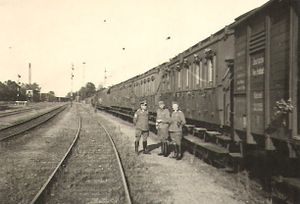
The wagons are here! The regiment begins to load.[6] Our battalion makes the start. The station is a small, double-track terminus. Around noon, the first units move to the station and take up cover from aircraft under trees and between the few buildings, while the assigned MG groups take up positions to provide anti-aircraft defence during the loading operation. Then we move onto the platform one company at a time. The crews are distributed to the wagons, deposit their luggage there and then go in groups to their vehicles to help with the loading. A hustle and bustle begins between piles of weapons and equipment. In shuttle traffic, the soldiers haul piece after piece into the wagons. Other groups push the vehicles onto the flat wagons. In front by the first wagons, the horse paddocks stand between high walls of straw bales. The drivers bring horse after horse into the wagons. Some animals are nervous and frightened when they step onto the hollow-sounding footbridge between the platform and the wagons. But with great patience they manage to get them into the wagon with their heads covered or backwards or with other tricks. Our drivers know their job. Everything runs smoothly. Shouts, commands and the noisy “hau-ruck” (heave-ho) of the working men echo through the air. Seldom have they worked with so much dedication. The vehicles are wedged onto the flat wagons with loud hammer blows and then lashed down.
In the evening we have finished. The train guard is assigned and another detachment for partisan fighting is deployed, which spreads out around the station area. We are ready to leave. I am lying in a goods wagon with 26 men from my platoon. We have stretched out on the straw cushion and are waiting for departure. But hour after hour passes without anything happening. Finally we fall asleep.
Towards morning I wake up to a jolt. A slight shaking goes through the train, and then it slowly starts moving. We leave Slavyansk. The city where we leave behind so many memories. Memories of bloody battles, icy winters, good and bad people and tender experiences. And if the joy of returning home after such a long time were not so great, a little melancholy might well be mixed in with the cheerfulness.
It is 4 o’clock in the morning. The train is just passing the kilometre-long row of houses in Krassnoarmeisk. Once again, the memories of the dangerous time we spent over there come to life. It was a freezing winter then, and we fought bloody battles with the Ivan, earning myself the EK II. Today, hot summer air lies over the green land, only the ruins of the village remind us of those evil times. Now I see how big the village is, and how small the part we occupied at that time. But it could also be that the village to the west is already a different village.[7]
Barwenkowo and Losowaja are passed. The train has reached its travelling speed and now the wheels are rolling and knocking in a monotonous rhythm. It is music to our ears! I have chosen a place in the driver’s seat of an HF1, and from this comfortable high seat I have a wide view over the country. Other comrades sit in the open wagon door, let their legs dangle out forbiddenly and look with bright eyes into the passing country. Like a colourful carpet, the fertile landscape of Chernozem spreads out before our eyes. Between green and brown areas stretch the waving fields of golden-yellow wheat. From time to time, the whitewashed houses of a village shine in the distance. And a radiant summer sun glistens over this land heavy with fruit. It is hot, but the breeze brings mild cooling. So we roll happily through the light-flooded land of the laughing Ukraine.
We stop at larger stations to change locomotives and to water the horses. Then civilians also get on board, mostly women and girls, who travel with baskets and bundles to the next market place to sell their eggs, cucumbers, butter, flour, vegetables and other things. In exchange for a few eggs, we gladly give them a lift, and they are happy not to have to walk the long way in the heat. Unfortunately, some of them are arrested by German railway policemen when they get off the train at the next station. Whether this trade is forbidden, or whether they just want to control them, or whether the policemen just want to collect their obolus, I don’t know. Measures taken by the civil administration![8]
One day our fate becomes critical. Behind Kharkov, it will be decided whether we continue our journey or are thrown into a burning spot on the front. We don’t want to share the fate of our sister regiment, which was loaded a week before us and was also to be transferred to France. But at Rschew it was suddenly unloaded and thrown into the battle. That’s where where they’re still grappling today.
We have reached the Desna. With a dull roll our train crosses the bridge[9], but below us stretch wide, green meadows, from which the massive bridge pillars rise. These meadows on either side of the river are kilometre-wide flood strips, inundated by the river at high tide. Now they are partly dry, partly marshy and in places overgrown with bushes. Only here and there a small pool of water or the narrow silver ribbon of a dead river branch glistens in the green areas. There seems to be no end to the bridge. After a long time, we finally cross the river, which flows broad and shallow, interspersed with many sandbanks, below us. Once again we roll across the wide floodplains on the other side, and then we have finally crossed the stream valley. What an obstacle for the traffic! Such an overgrown river valley can almost be a natural border.
We assume that we passed through Gomel at night. Now we are rolling towards Minsk. The landscape has changed completely in the meantime. The farmland has largely disappeared. The forest dominates the landscape. Hour after hour, day after day, we roll through seemingly endless wooded areas. Once it is opaque birch and oak high forest that passes us by like a wall of green foliage. The rampant undergrowth makes this primeval forest difficult to access. Then again, sparse swamp forests follow. Vast, sparse stands of trees alternate with shrubs and bushes or wide clearings. Bogs and swamps interrupt the forest. A forest fire has also eaten a hole into the forest. Only rarely does the forest clear to make way for a human settlement. Log cabins with shingle roofs. Grey and brown are these cottages, like the colour of the forest and the earth. They hardly stand out from the surroundings. Modestly, these little villages with their sparse farmland duck between the almighty forest. But there are also larger villages that lie in the middle of large clearing areas and have extensive arable land. Here, man has taken up the fight with the forest, cleared it in a wide radius and created large fields over which horse-drawn ploughs and tractors draw their furrows.
On the whole, however, it is an unpleasant area, difficult to access, in whose endless forests numerous partisan gangs are hiding and threaten our supply routes. For this reason, the forest to the right and left of the railway tracks has been cut down to a width of up to one hundred metres in places, in order to make it difficult for sabotage troops to approach. In addition, bunkers and bases with German crews are located at greater intervals along the entire line, which then send patrols along the tracks. In addition, Russian civilians are stationed at particularly dangerous points as double posts at a distance of two hundred metres, but they are certainly not to be relied upon. All these measures have little success, however, because the wagon debris we pass again and again is evidence of numerous successful acts of sabotage.
We are a hundred kilometres east of Minsk. The train is creeping through the forest at the prescribed speed of only 4 km/h. The morning is dawning, but everyone is still asleep when the train is suddenly rocked by two violent shocks. I jump up, tear open the compartment door and look along the train. Everywhere soldiers are already jumping out and running across the clear cut to the edge of the forest to make secure. I run along the train to the front and now see the whole mess: the train has run onto mines! The locomotive has fallen down the embankment, is lying on its side and is blowing steam hissing and whistling. It sounds like the rattle of a primeval animal. The driver and stoker are unhurt, they were able to jump off in time and are now standing in front of their overturned locomotive with their carbines shouldered. The two front wagons have also toppled over. There are horses in both wagons, which, incomprehensibly, are behaving completely calmly. They were all unhurt. In the middle of the train, two crew wagons slid into each other. They reared up and then tipped to the side so that they were lying on the tracks like a triangle. There was one dead and three injured. The dead man is from Sudetenland. The Russian track guards stand by indifferently. If you reproach them, they just shrug their shoulders. Less than three minutes have passed since the explosion. Our “security squads” have reached the edge of the forest. There we see another picture typical of the landsers’ recklessness: all along the edge of the forest they squat in a long chain with their trousers down. For them, neither partisans nor the danger of attack exist. The “business” is more important.
I hear from the engine driver that a breakdown train has been requested from Minsk. But it can take two to three hours before it arrives. We immediately start freeing the horses. The animals behave very sensibly, so that we have freed them all unharmed in a short time. Then we get the luggage out of the destroyed team wagons. After a while the breakdown train arrives. The massive tractor of the breakdown train is coupled in front of the locomotive, starts up with a humming engine and pulls the locomotive down from the embankment like a toy. It does the same with the wagons, and after a short time everything is cleared away. Then a replacement locomotive sets itself in front of the train, and at 12 noon we roll on.[10]
Partisan warfare is almost a fight against windmill wings. These partisans are fanatical, brutal enemies, specially trained for hedge warfare. They are far more dangerous than the soldiers of the Red Army. What makes it even more difficult for us is that they are well “camouflaged” as civilians, that they are almost impossible to catch in the endless, often swampy forests that they know well, and that these methods of underhanded hedge warfare are unknown to us and do not suit us by nature. The Russian, however, is a master in this field through character, experience and local knowledge.
Soon we have reached Minsk. Here the whole event is discussed again with the German railway staff, who have experienced all sorts of things in this field. One of them wears a medal ribbon that we have not yet seen: The medal for the Winter Battle in the East 1941/42. Everyone who was in Russia in the winter of 1941/42 gets this. The railwaymen already have it, we front-line fighters not yet.[11]
The Minsk goods station is bordered to the south by a steep embankment almost twenty metres high. At the top is a settlement whose houses reach almost to the edge of the escarpment. As we still have time due to the change of locomotives, we climb up the embankment and can overlook the whole extensive area of the goods station from here.
On we go. The next big station is Baranavichy. We are approaching the Polish settlement area. The landscape begins to change noticeably. We gradually roll out of the forest area into more open landscapes. The farmland is gaining in extent. But it is no longer the monotonous, unmissable giant fields of Russia, but smaller fields joined together at right angles. Often they are long and narrow like towels. Pastures and green meadows alternate with brown fields. Huge forests still stretch out, but the land is already more structured. It is more diversely cultivated. The villages are becoming more numerous. The roads are more often paved. They are flanked on both sides by rows of trees and enliven the landscape. People are appearing more frequently. The girls wear ribbons and the women combs in their hair. People and landscape have changed. From the natural landscape of the Russian forest wilderness we enter Polish cultural territory.
Our wheels roll restlessly. Their rattling and pounding sounds like music to us. We are heading west! Before Warsaw we have to stop for a while, and then we ride through the beautiful western suburbs of the city, sometimes coldly ignored by the Polish girls, sometimes greeted with friendly waves.
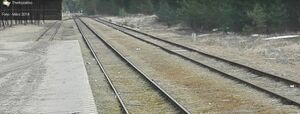
We have reached German Reich soil. Slowly the long train rolls into the small goods station and then stops with a quiet jolt. We are standing in Neuhammer/Silesia[12]. I get out and put my foot down emphatically and insistently. After a long and dangerous time, I am standing on German native soil again. It is an inexpressibly glorious feeling. The soul sings and rejoices. Home is safety.
There are all kinds of rumours. We’re supposed to stay here for now, we’re supposed to go straight to France. But nobody knows anything for sure. In any case, they send a whole swarm of soldiers on holiday, right off the ramp. After an hour, they’ve all disappeared.
I first go in search of a telephone, because I want to call home. Next to the station area is a large sawmill, whose office I enter. There is a telephone here, which is willingly put at my disposal. I register a long-distance call to Berlin and twenty minutes later it rings. I pick up the receiver and answer. And then the familiar voice of my dear mother answers in the shell. She is enormously surprised and delighted. I tell her very briefly where I am and that I will probably be on holiday soon. Then I hang up, so that it won’t be so expensive[13] when they already kindly let me call for free.
|
Editorial 1938 1939 1940 1941 1942 1943 1944 1945 1946 1947 1948 1949 Epilog Anhang |
|
January February March April May June July August September October November December Eine Art Bilanz Gedankensplitter und Betrachtungen Personen Orte Abkürzungen Stichwort-Index Organigramme Literatur Galerie:Fotos,Karten,Dokumente |
|
1. 2. 3. 4. 5. 6. 7. 8. 9. 10. 11. 12. 13. 14. 15. 16. 17. 18. 19. 20. 21. 22. 23. 24. 25. 26. 27. 28. 29. 30. 31. Erfahrungen i.d.Gefangenschaft Bemerkungen z.russ.Mentalität Träume i.d.Gefangenschaft Personen-Index Namen,Anschriften Personal I.R.477 1940–44 Übersichtskarte (Orte,Wege) Orts-Index Vormarsch-Weg Codenamen der Operationen im Sommer 1942 Mil.Rangordnung 257.Inf.Div. MG-Komp.eines Inf.Batl. Kgf.-Lagerorganisation Kriegstagebücher Allgemeines Zu einzelnen Zeitabschnitten Linkliste Rotkreuzkarte Originalmanuskript Briefe von Kompanie-Angehörigen |
- ↑ On 2 Aug acc. to Benary p. 105
- ↑ in the original “south-east” which does not fit the position of station, brook and village
- ↑ Andreyevka, cf. 11.3.42
- ↑ Criticism of this kind has even been reported to the OKW by competent units (see e.g. KTB OKW 1943 p. 1424 f.), but this of course did not change official policy.
- ↑ The photo may be from another, similar transport, but in any case shows troops of XXXXIV AK, to which 257 ID then belonged.
- ↑ Date cannot be determined, as the division was transported off for six days from 29.07. with 1 train each, then 6 trains per day (KTB 257. I.D., NARA T-315 Roll 1804 Frame 000936). On 06.08., e. g., a transport train with divisional staff, staff of signals battalion, light signals train and military police squad departed Slavyansk at 13.40 (KTB 257. I.D., NARA T-315 Roll 1804 Frame 000939); it was given a festive farewell.
- ↑ The author was not mistaken: Krassnoarmeisk is nearly 6 km long.
- ↑ The thought that civilians - especially of the enemy state - have no business on a military train did not occur to the helpful author!
- ↑ presumably the bridge at Vitemlya.
There are five bridges on suitable railway lines:
- at [Chernihiv] (500 m long); the large town would certainly have been mentioned, and the 3 km wide flood plain is only to the south, not also to the north as mentioned in the text.
- at Makoshyne (300 m); the village, which is perhaps still worth mentioning, lies directly at the bridge, the river is deeply cut without the flood plain mentioned in the text; however, it lies on the direct and back then unique double-track line from Kharkov to Minsk, cf. Hinze p. 17
- at Pyrohivka (500 m); the river is also deeply cut here without a flood plain.
- at Vitemlya; the actual bridge is only 300 m long, but together with the adjoining railway embankments an impressive, 3 km wide river lowland is crossed
- at Wygonitschi near Brjansk, 250 m long in the middle of a 3 km wide flood plain; but this route would be a diversion.
- ↑ The area between Bobruisk and Minsk was notorious as a “partisan forest” (Benary p. 107).
- ↑ The award is entered in the Soldbuch with the date 25.07.1942. So, the entry was backdated.
- ↑ certainly the Training area Neuhammer (at Świętoszów), which has a small marshalling yard on the east side
- ↑ A lifelong bad habit of my father’s, who even cut short rare, almost Christmas-only long-distance calls with his brother, “so that it won’t be so expensive.”

